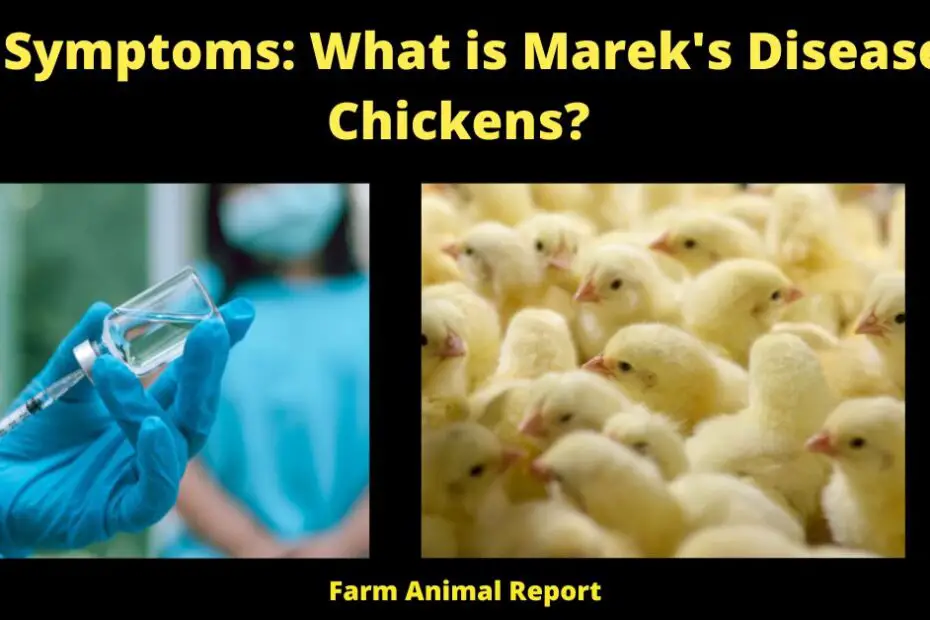Marek’s Disease is a type of poultry cancer that affects chickens. It is a highly contagious disease and can cause serious problems for your flock. In this blog post, we will discuss what Marek’s Disease is, how to recognize the symptoms, and how to treat it. We will also cover some tips on prevention so that you can protect your chickens from this deadly disease!
Marek’s disease is a viral infection that affects chickens. The disease is named after Dr. Josef Marek, who first described it in 1907. It is caused by a herpes virus called Marek’s disease virus (MDV). The virus is spread through contact with infected birds (Sick Birds} and can cause severe respiratory illness, neurological problems, and death in chickens.
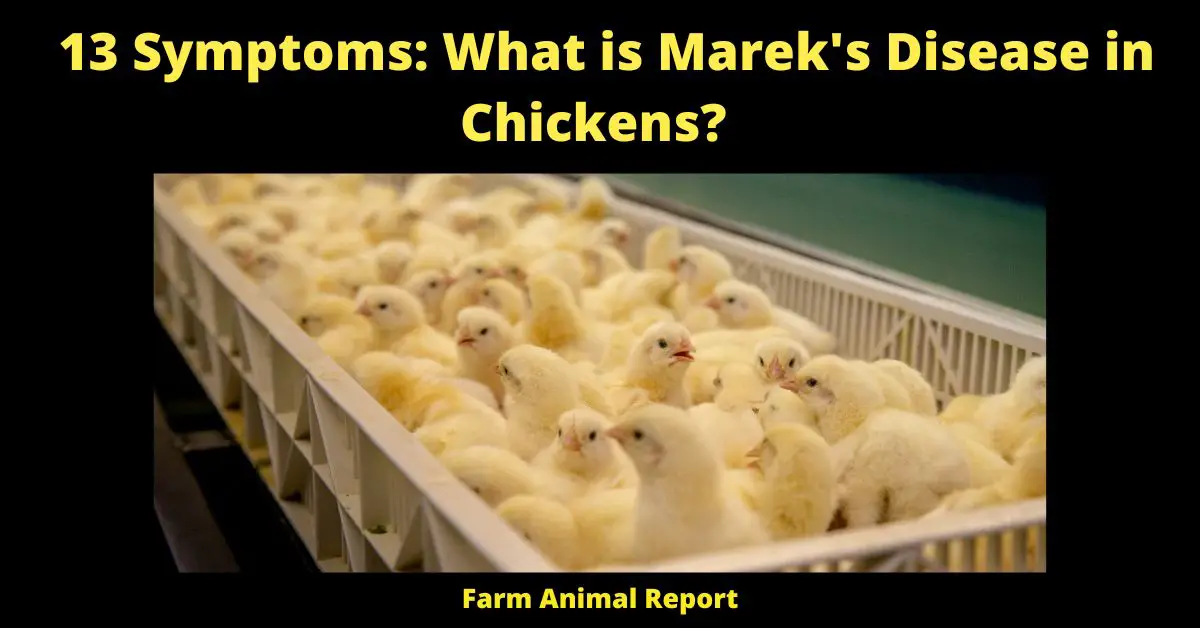
Chickens of all ages can be affected by the disease, but it is most common in young birds. Symptoms of Marek’s disease include paralysis, tremors, weight loss, and poor feathering. There is no cure for the disease, and it is highly contagious, and it is fatal in most cases. However, there are vaccines ( strengthen t- Cells) available that can help to prevent infection. Marek’s disease is a serious problem for the poultry industry, and strict biosecurity measures should be taken to prevent its spread.
Mareks disease kills more chickens than any other disease in Chickens. It is so common that the best advice is to accept that your flock has been infected.
What Causes Marek’s Disease in Chickens
Marek’s disease is one of the most common chicken diseases, and it can be devastating to a flock. Every Flock is assumed to be infected.
The disease is caused by six different hyperviruses, and it primarily affects young chickens. Symptoms include paralysis, tumors, and death. The virus is spread through contact with infected birds, and it can also be transmitted through contaminated equipment or clothing.
Vaccines are available to help prevent the disease, but they are not 100% effective. In addition to causing illness in chickens, Marek’s disease can also reduce egg production and cause birth defects in chicks. As a result, it is important for farmers to be aware of the signs and symptoms of the disease, and to take steps to prevent its spread.
What Can Cause Mareks Disease in Chickens?
Weakened immunity in your chickens can open the door to Mareks disease in your flock
Mareks disease is a serious viral infection that can affect chickens of all ages. Generally, unvaccinated chickens have a high mortality rate. The virus is spread through contact with infected birds, and it can cause paralysis, blindness, and even death. There are three main types of Mareks disease, and each one can cause different symptoms.
The most common type is known as classic Mareks disease, which typically affects young birds between the ages of six and twelve weeks old. Symptoms of classic Mareks disease include paralysis of the legs, wings, and neck, as well as greyish-white lesions on the skin.
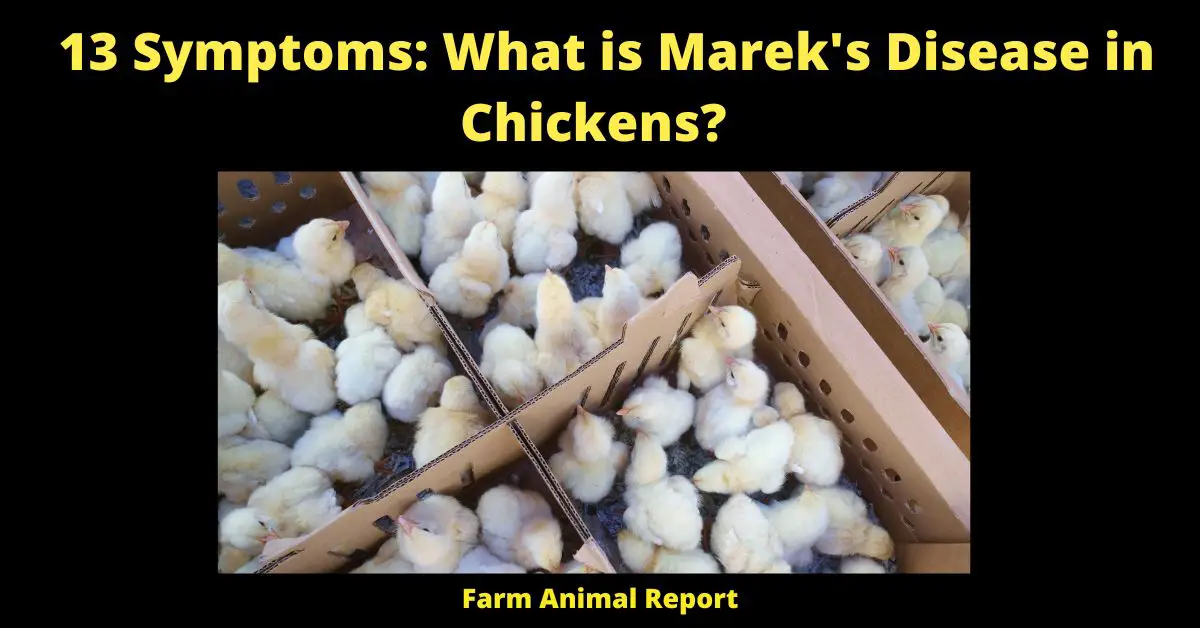
The second type of Mareks disease is called difficult Mareks disease, which affects older birds and can cause severe neurological signs such as tremors, convulsions, and paralysis. The third type of Mareks disease is called tumorous Mareks disease, which is the rarest but also the most aggressive. This form of the virus can cause tumors to form in the body, and it can be fatal if not treated quickly. Thankfully, there are vaccines available that can help to protect chickens from all three types of Mareks disease.
- Overcrowding
- Stress of Moving
How is the Marek Virus Transmitted?
The Marek Virus is a chicken cancer that is deadly to poultry. The virus is most commonly transmitted through contact with infected chicken feathers, but it can also be spread through contact with infected chicken blood, saliva, or feces. The virus can also be spread indirectly, for example, if infected chicken brushes against something that another chicken then touches.
The virus can even be spread through the air if feathers or other materials contaminated with the virus are airborne. As a result, it is very important for farmers to take precautions to prevent the spread of the Marek Virus, such as keeping sick chickens isolated from healthy ones.
How Eary can Marek’s Virus show up in Chicks?
Marek’s disease is a fast-acting virus that can kill chicks within days of infection. The virus is spread through contact with affected birds and can remain active in the environment for months. Chicks can be infected with the virus before they hatch, and the incubation period is typically two to three weeks. However, some birds may not show any symptoms until they are several months old. Marek’s disease is fatal in most cases, and there is no known cure.
However, vaccinated birds can often survive an infection. As a result, it is important to vaccinate chicks as soon as possible after they hatch. Early detection of Marek’s disease is crucial, as the virus can spread rapidly through a flock.
Symptoms include paralysis, loss of appetite, and diarrhea. Affected birds may also have ruffled feathers and sores on their feet or legs. If you suspect that your bird may have Marek’s disease, it is important to isolate it from the rest of the chicken flock immediately. You should also contact your veterinarian for further information and guidance.
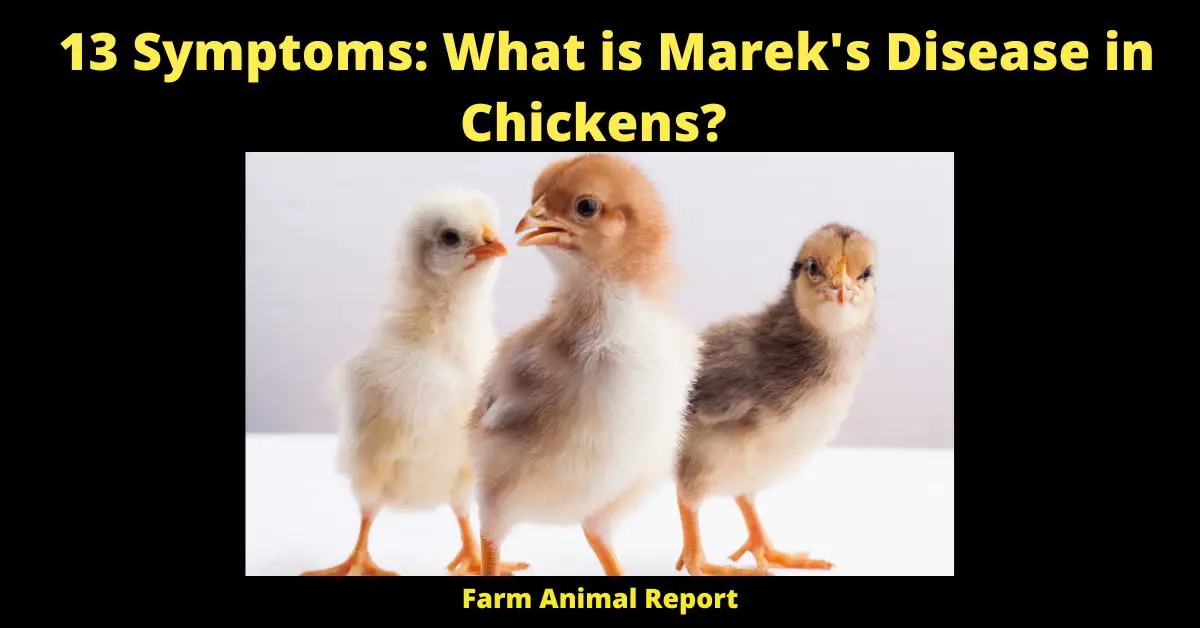
Can Chickens recover from Mareks Disease and How Long does it take?
Chickens are susceptible to a disease called Mareks Disease, which is caused by a virus. The virus affects the nervous system and can cause paralysis. There is no cure for Mareks Disease, and it is fatal in most cases. However, some chickens have been known to recover from the disease.
Recovery typically takes place over the course of several months, and affected chickens may never fully regain their mobility. Chickens that do recover from Mareks Disease are typically immunized against the virus, and can live relatively normal lives. Farmers that suspect their chickens have Mareks Disease should consult with a veterinarian immediately. Early diagnosis and treatment is essential for the best chance of recovery.
How Long can the Marek Virus survive without a Host?
The Marek Virus is one of the most deadly diseases that can affect chickens. The virus causes tumors to grow on the nerves and organs of the chicken, and it can kill an infected bird within days.
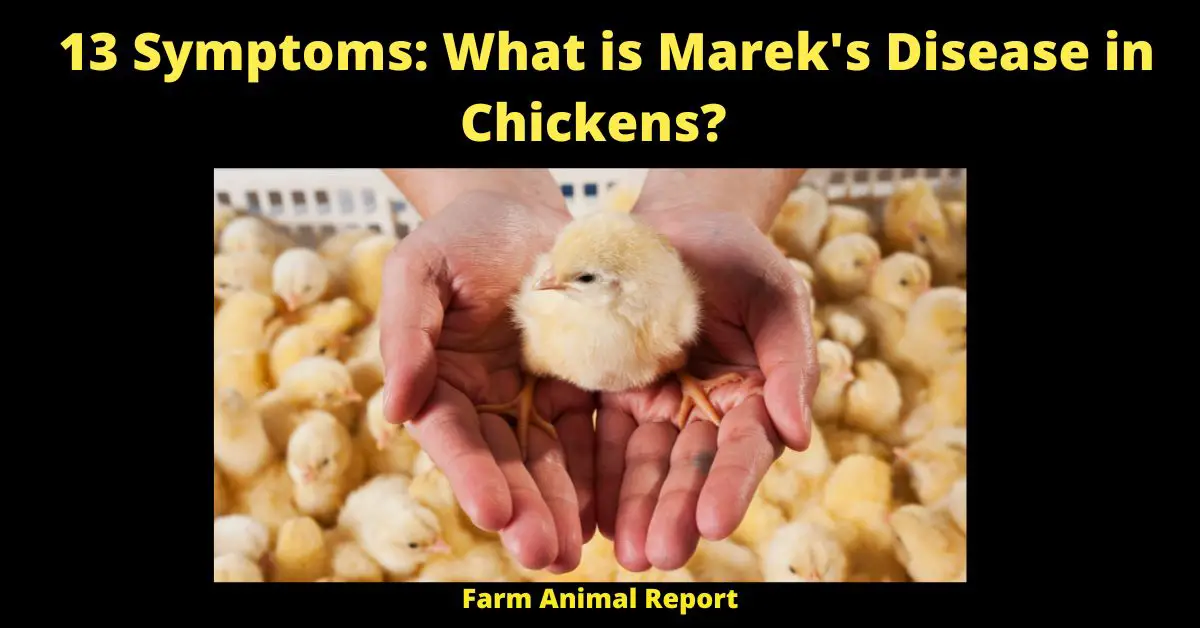
The virus is spread through contact with contaminated feces, feather follicles, and Dander and it can survive for months in the environment.
This means that even if all the infected chickens are culled, the virus can still infect new flocks if they are housed in contaminated coops or ranges. The only way to completely eradicate the virus is to clean and disinfect all chicken housing and equipment. This is a time-consuming and expensive process, but it is essential for preventing further outbreaks of the disease.
What are the Symptoms of Marek’s Disease in chickens? Clinical Signs
What are the 4 Forms of Mareck’s Disease? (Virulent Strains)
Skin
- Feather Follicles are enlarged?
Nerve
- Growing Paralysis
- Weight Loss
- Anemia
- Hard Breathing
- Diarrhea
Eyes
- Turning Grey – Shrinking Iris
- Irregular Pupils
- Diarrhea
- Blindness
- Death
internal organs
- Tumors in Ovary
- Tumors in Heart
- Tumors in Lungs
How to Treat Marek’s Disease in Chickens?
- Vaccinations ( Strains of Turkey Virus)
- Separation of young Chicks
- Strick sanitation
- Vaccinations at hatching
- Vaccinations need 1-2 weeks for immunity
What is OVO Vaccination in Embryos on the 18th of incubation?
Ovo vaccination in embryos on the 18th of incubation is a process in which a vaccine is injected into an egg before it hatches. This helps to ensure that the chick that hatches will be immune to the diseases that the vaccine protects against.
Ovo vaccination is a relatively new technology, but it has already been shown to be highly effective. In one study, chicks that were vaccinated in this manner were significantly less likely to succumb to Newcastle disease than those that were not vaccinated. This is just one example of how ovo vaccination can help to keep chickens healthy and prevent the spread of disease.
How can I prevent Marek’s disease in Chickens?
Chickens are susceptible to a number of diseases, but one of the most serious is Marek’s disease. This disease is caused by a virus that attacks the nervous system, and it can be fatal to young chickens. Fortunately, there are a number of steps that farmers can take to prevent Marek’s disease. One of the most important is to vaccinate all new chickens.
Isolate contact from New Birds.
This vaccine helps to build up the chicken’s immunity to the virus, and it should be given as early as possible. Additionally, it is important to maintain clean facilities and to quarantine any sick chickens. By taking these precautions, farmers can help to protect their flocks from Marek’s disease is easily transmitted by dander and chicken feather follicles.
How can I help my chicks develop natural immunity?
Keeping Chicks separate from rest of flock for 5-6 weeks. Will help them develop Immunity.
Chicks are born without immunity, which makes them susceptible to diseases. Fortunately, there are several things that you can do to help your chicks develop natural immunity.
One of the best ways to help is to provide them with a clean and safe environment. Make sure that their housing is clean and free of debris, and that they have access to fresh water and food. You should also avoid overcrowding, as this can lead to stress and illness. Additionally, it’s important to introduce your chicks to different types of bacteria in their environment.
This can be done by allowing them to peck at dirt or grass, or by providing them with grit. As they come into contact with different bacteria, they will build up their immunity and become better equipped to fight off disease. By taking these steps, you can help your chicks develop natural immunity and enjoy a healthy life.
At what age should I vaccinate my chicks?
When it comes to vaccinating your chicks, timing is everything. The first few weeks of a chick’s life are critical for its development, and many vaccines need to be administered during this time window in order to be effective. As a general rule of thumb, chicks should be vaccinated at 6-8 weeks of age. However, some vaccines (such as Marek’s disease)( Merek’s Vaccine} can be given as early as (Embryo – 3 weeks of age (earlier the better). Consult your veterinarian for specific recommendations on vaccinating your flock. With proper vaccination, you can help your chicks stay healthy and safe from disease.
Unvaccinated CHickens should be quarantined for a period before introducing them to new chicks.
What chicken Breeds are more Resistant to Mareks Disease?
Generally, the meat breeds seem to be more resistant to the Disease. Silkies and Leghorns are very susceptible.
What are the zoonotic risks associated with Marek’s disease?
Marek’s disease is not a zoonotic disease, meaning it cannot be transmitted from chickens to humans. However, the virus that causes Marek’s disease virus has been studied in the prevention of cancer in humans, so it is important to take precautions when handling infected birds or their body fluids.
You should always wear gloves and a mask when handling sick birds, and wash your hands thoroughly afterward. You should also avoid contact with the feathers, blood, saliva, or feces of infected birds. If you must come into contact with these materials, you should wear protective clothing and wash your hands thoroughly afterward.
What are some common misconceptions about Marek’s disease?
One common misconception about Marek’s disease is that it only affects young birds. However, the virus can infect chickens of any age. Another misconception is that Marek’s disease is only a problem in commercial chicken operations.
However, the virus can affect backyard flocks as well. Finally, some people believe that Marek’s disease is only a problem in certain parts of the world. However, the virus can be found anywhere chickens are present.
Marek’s disease is a serious viral infection that can affect chickens of any age. The virus is spread through contact with infected birds, and can remain active in the environment for months.
Chicks should be vaccinated as soon as possible after hatching, and all birds should be isolated from sick birds immediately. If you suspect that your bird may have Marek’s disease, it is important to contact your veterinarian for further information and guidance. Early detection is crucial, as the virus can spread rapidly through a flock.
Can my other Livestock Catch Marek’s Disease
Marek’s disease is a virus that causes cancer in chickens. It is spread through contact with the feces of an infected bird. The virus can also spread through feather dander, dust, and other objects that have been contaminated with the virus.
Marek’s disease is not contagious to humans or other animals. However, it can be deadly to Chickens. There is no cure for Marek’s disease, and it is fatal in almost all cases. Chickens that have been exposed to the virus may not show any symptoms for weeks or even months. The first signs of Marek’s disease are usually paralysis in one or both legs.
The virus can then spread to the respiratory system, causing difficulty breathing. As the disease progresses, it will cause Blindness, lethargy, and eventually death. Chickens that have been vaccinated against Marek’s disease are much less likely to develop the disease. However, there is no vaccine that is 100% effective.
If you have chickens, it is important to monitor them closely for signs of Marek’s disease. Any chicken that shows signs of paralysis should be isolated from the rest of the flock and euthanized immediately.
Can Humans Catch Marek’s Disease from Chickens?
No, humans cannot catch Marek’s disease from chickens. Marek’s disease is viral cancer that affects chickens, causing tumors to form on their internal organs, nerves, and skin. The virus is spread through contact with infected chicken cells, so it is not possible for humans to catch the virus from chickens.
However, humans can spread the virus to chickens if they come into contact with infected cells from another chicken. For this reason, it is important for farmers to maintain good biosecurity practices and avoid contact with chickens that may be infected with Marek’s disease.
Can you eat chicken meat from Chickens that have Mareks disease?
Mareks disease is a highly contagious virus that affects chickens. The virus attacks the nervous system, causing paralysis and sometimes death.
Chickens that contract Mareks disease may appear healthy at first, but they eventually develop neurological symptoms, including tremors, weakness, and paralysis. The virus is most commonly spread through close contact with infected birds, and it can also be transmitted through contaminated equipment or clothing.
There is no treatment for Mareks disease, and once a chicken is infected, it will usually die within a few weeks. However, some chickens may survive for several months or even years after contracting the virus. Chicken meat from chickens that have Mareks disease is perfectly safe to eat.
Can you eat Eggs from Chickens that have Mareks Disease?
Chickens are susceptible to a number of diseases, including Mareks disease. This viral disease affects the nervous system and can be deadly. However, chickens that have been infected with Mareks disease can still lay eggs that are safe to eat.
The virus does not affect the quality of the eggs, and there is no risk of transmission to humans. However, it is important to take care when handling eggs from infected chickens. Wash your hands thoroughly after collecting the eggs, and avoid touching your face or mouth. Eggs from chickens with Mareks disease are safe to eat, but it is important to handle them carefully.
Final Thoughts – What is Marek’s Disease in Chickens?
In summary, Marek’s disease is a highly contagious virus that affects chickens. The virus attacks the nervous system, causing paralysis and sometimes death.
Chickens that contract Mareks disease may appear healthy at first, but they eventually develop neurological symptoms, including tremors, weakness, and paralysis. There is no treatment for Mareks disease, and once a chicken is infected, it will usually die within a few weeks.
However, some chickens may survive for several months or even years after contracting the virus. Chicken meat from chickens that have Mareks disease is perfectly safe to eat, as are the eggs. However, it is important to take care when handling eggs from infected chickens.
Wash your hands thoroughly after collecting the eggs, and avoid touching your face or mouth.
God Bless Greg
References:
Merck Veterinary Manual
Chicken Health handbook
The Chicken Encylopedia


